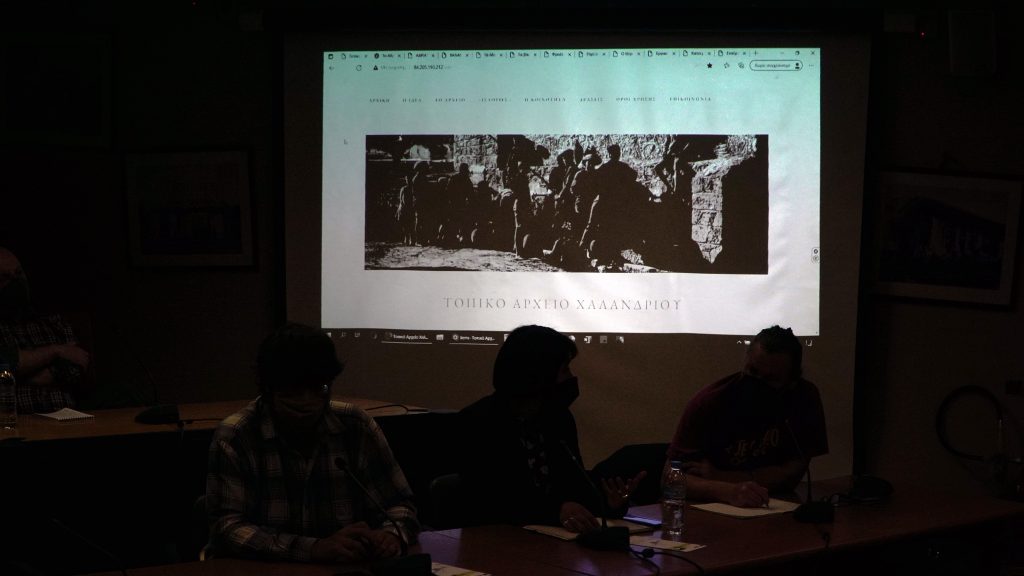
A state of art digital archive which collects historical evidence and testimonies for the history and the cultural heritage of Halandri city has been made accessible at the city’s first digital Local Archive The platform was created in the frame of Cultural H.ID.RA.N.T. – U.I.A. project focusing initially on the triptych ‘Hadrian Aqueduct – Halandri – Water’. In other words, it started by documenting the history of, and the relationship between the residents and the city with, this roman aqueduct as a cultural heritage, local landmark, and natural resource.
This digital tool aspires to act as a reference point and entrance to free access to available resources on Hadrian Aqueduct and on the local history. It aims in this way to trigger the production of new citizen-led knowledge about the city’s history. Moreover, the participative and collective making of the digital archive, which will be managed and developed further by the local community according to its needs and aspirations, is a groundbreaking endeavor.
The making of an archive to document the local history of Halandri and the Hadrian Aqueduct has been among the main aims of the Cultural H.ID.RA.N.T. – U.I.A. project. The Local Archive compiles and interconnects in a single digital platform evidence, materials, and testimonies (original artifacts or digital copies), as well as, links of resources and documents hosted in other digital sources – archives of public institutions, local groups, private collections, etc. Beyond the digital archive, the platform hosts topical stories that are presented in a multimedia form, combining text, illustration, and audio-visual material. It aspires thus to function as a medium of documentation, of access to the sources, and of new knowledge production around Halandri’s history, past, and present.
Responsible for the creation of the archive has been the Mediterranean Institute for Nature and the Anthropos (MedINA) which compiled and curated the archival material in a single digital pool and developed the www.archalandri.gr platform. MedINA researched and logged a large volume of sources (documents, news articles, maps, photographs, surveys, etc.) for the ancient and modern history of the Hadrian Aqueduct. It also conducted interviews with specialists from the Technical University of Athens, Athen’s water provider EYDAP, the East Attica Ephorate of Antiquities, and people with expert knowledge and personal interest in the roman aqueduct and the city of Halandri.
Putting together the archival material has been a collective enterprise that lasted one and a half years. Local groups and bodies, as well as, academic and public institutions were involved. The Oral History Group of Halandri offered over 50 extracts of interviews conducted with local residents. Those samples bring light to the close relationship and experience of the city’s everyday life with the element of water and the Hadrian Aqueduct. The Association for the Protection of the Rematia Stream indicated historical documents were produced in local struggles for the preservation of the natural and water resources of the area. The Municipality of Halandri handed in a significant number of black and white photographs depicting life in the city in the mid-war period and until the 1950s. EYDAP offered from its archive historical artifacts (photographs, maps, long sections etc.) related to the Hadrian Aqueduct and the history of water networks in Athens. Last, but not least, the East Attica Ephorate of Antiquities and DEAM granted records and photographic material that document the attempt to rescue the Hadrian Aqueduct after decades of violent urbanization which hid its route and its visible marks (reservoirs) throwing such resilient water and cultural resource into oblivion in the last half of the 20th century.
In addition, local citizen groups, schools, and institutions, the partners of Cultural HIDRANT project, and specialists were engaged in the archive’s making process. Workshops organized by MedINA and other CH’s partners made possible the foregrounding of Hadrian Aqueduct’s cultural value, the identification of other spots of interest for the local community, and the latter’s acquaintance with the Local Archive and the discussions about its significance and future. The outcome of such research osmosis has been the production of a “long story” of Hadrian Aqueduct from MedINA -accesible online- which combines a variety of storytelling and representation mediums (speech, illustrations, maps, interviews, etc.).

The Local Archive has been from the outset designed in order to host thematic digital storytelling “told” by local citizens, groups, schools, or specialists. The Oral History Group of Halandri prepares, already, a “digital history walk” across the city’s historical hotspots and places of memory. MedINA also prepares two video toolkits to assist the management of the digital archive and to facilitate and guide the production of new “digital stories” by anyone who wants to. In this way, it is attempted for the local community to engage and be “in dialogue” with its history through the archive. To enable the community to raise its own research questions and to enrich the archive’s contents with new material and testimonies.
Thus, in addition to being a public knowledge hub and educational resource, the archive aspires to become an active tool in documenting the local history and memory. A medium in the hands of the local community to recognize its diversity, to record its specific natural and cultural heritage, to enhance the sense of its identity, participation, and cooperation that may benefit multiple interests, publics, communities, and uses.
The participation of citizens in the management of the Local Archive becomes thus the critical factor for the latter to be “lively” and useful to the community institution. The core of the Archive’s Community will be formed through a deliberation process within the next couple of months. Aim of this collective body is the maintenance, update and enrichment of the archive’s material; as well as the development of a network of cooperation with other similar bodies, initiatives and cultural events to feed the Archive’s pool and trigger dialogue, reflection and creative actions. In this frame, the Municipality of Halandri will act as a facilitator and supporter of such a process.
We invite anyone interested to contribute to the Local Archive with new material or by participating in the formation of its management collective body to contact us through the platform’s “communication” menu.

